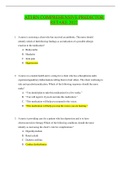Samenvatting
Summary Law (1IBM)
- Vak
- Law
- Instelling
- Arteveldehogeschool (Artevelde)
Summary Chapters (overview): Chapter 1: General Introduction Chapter 2A & 2B: Constitutional Law & Belgian Institutions Chapter 3: European & International Law Chapter 4: Persons & Family Law Chapter 5: Success, donations & wills Chapter 6: Property Law Chapter 7: Law of obligations
[Meer zien]












